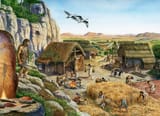Search Results
ID: DGJhYaPl/pol/509505552#509506286
7/4/2025, 7:29:40 PM
Religious belief represents the intellectual middle ground—the midwit state where humans are smart enough to ask profound questions about existence but not sophisticated enough to accept uncertainty or pursue rigorous empirical answers. When early agricultural societies gained leisure time to observe natural phenomena they couldn't explain, they defaulted to creating divine beings rather than developing systematic methods of investigation. This impulse to fill knowledge gaps with supernatural agents reveals a mind that has evolved beyond primitive survival mode but remains trapped in anthropomorphic thinking, projecting human-like consciousness onto forces beyond immediate comprehension.The believer occupies this awkward intellectual space between the unreflective and the truly analytical. They've developed enough abstract reasoning to grapple with mortality, meaning, and cosmic forces, yet lack the intellectual courage to sit with uncertainty or the methodological sophistication to pursue evidence-based understanding. Instead of recognizing the limits of human knowledge and working within those constraints, they retreat into comforting narratives about divine purpose and cosmic justice. This represents humanity's adolescent phase—no longer content with simple existence, but not yet mature enough to construct meaning without invisible parental figures. The creation of gods reveals more about human psychological needs than cosmic truths, marking the midwit's inability to graduate from needing external validation for their place in the universe.
ID: JDcDYVJu/pol/507443052#507443089
6/15/2025, 8:03:04 AM
The hunter-gatherer existed in a state of pure immediacy that rendered gods psychologically unnecessary and practically irrelevant. Their entire cognitive apparatus was devoted to survival's concrete demands—tracking animal movements, reading weather patterns, identifying edible plants, navigating terrain, and maintaining group cohesion. Every mental resource was allocated to tangible, observable realities that demanded immediate response. There was no luxury of contemplating abstract causation when a missed opportunity meant hunger, when a misread sign meant death, when group dynamics required constant attention to prevent exile. The hunter-gatherer's relationship with nature was direct and transactional—they understood storms as weather to shelter from, not as expressions of divine anger requiring interpretation or appeasement.
This cognitive state represented a kind of intellectual purity that agricultural societies would never recapture. The hunter-gatherer's mind operated like a finely tuned instrument of practical intelligence, processing environmental data without the interference of metaphysical speculation. They experienced what modern humans might call "flow state" as their default mode—completely absorbed in the present moment's demands, with no mental bandwidth for existential anxiety or cosmic questioning. Death was simply another environmental factor to avoid, not a philosophical problem requiring supernatural explanation. Pain, beauty, and mystery were immediate experiences to navigate rather than puzzles demanding narrative resolution. The absence of gods in their worldview wasn't intellectual limitation but cognitive efficiency—their minds were too occupied with reality's demands to construct elaborate fictions about invisible agents orchestrating their lives.
This cognitive state represented a kind of intellectual purity that agricultural societies would never recapture. The hunter-gatherer's mind operated like a finely tuned instrument of practical intelligence, processing environmental data without the interference of metaphysical speculation. They experienced what modern humans might call "flow state" as their default mode—completely absorbed in the present moment's demands, with no mental bandwidth for existential anxiety or cosmic questioning. Death was simply another environmental factor to avoid, not a philosophical problem requiring supernatural explanation. Pain, beauty, and mystery were immediate experiences to navigate rather than puzzles demanding narrative resolution. The absence of gods in their worldview wasn't intellectual limitation but cognitive efficiency—their minds were too occupied with reality's demands to construct elaborate fictions about invisible agents orchestrating their lives.
Page 1
